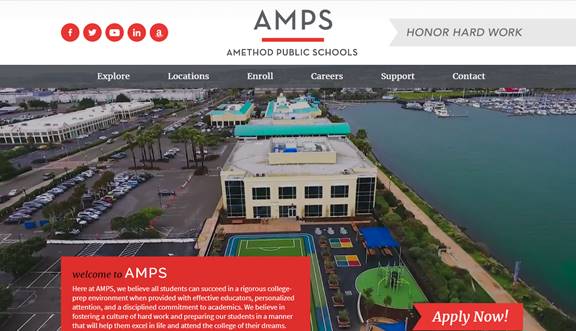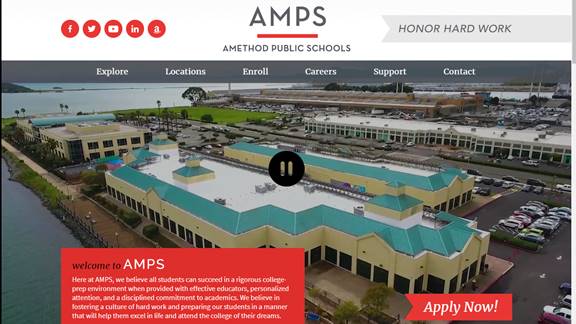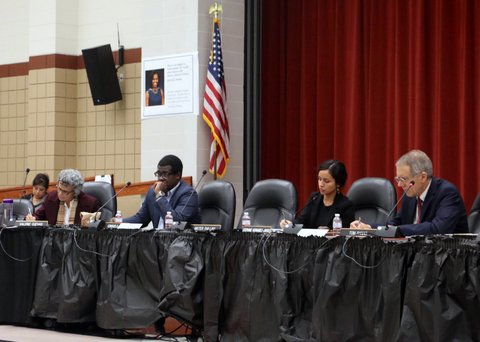|
| I continued item G-1 on the January 21 Agenda because I had some questions.
G-1 - HOLD a public hearing relating to the proposed issuance of charter school revenue bonds by the California Public Finance Authority (“CalPFA”), in an amount not to exceed $64,000,000, in connection with the issuance of charter school revenue bonds for Wonderful Foundations. The proceeds of the bonds will enable the Borrower to finance the acquisition of public charter school facilities located at 1402 and 1450 Marina Way South in the City of Richmond (the “Project”); and ADOPT a resolution to approve the proposed financing by the CalPFA.
The gist of the item was to provide City approval for bonds issued by the State of California for Wonderful Foundations to acquire the buildings ate Marina Bay that house the Benito Juarez Elementary School, the Richmond Charter Academy and the John Henry High School, all charter schools operated by Amethod Public Schools. The City of Richmond would have no responsibility for servicing the bond debt and no exposure in case of default. This looks like a no brainer, but it is a complicated web.
There are some community concerns that include:
As the City Council considers the Amethod School matter, Marina Bay Neighborhood Council asks that we also consider possible conditions to address the community concerns:
- Traffic on Marina Way South continues to be an issue. In a meeting with the Marina Bay Neighborhood Council before their permit was granted, staff committed to would work with the parents and guardians to stress the importance of carpooling and use of public transportation to cut down on the number of cars in the area. Their Conditional Use Permit required that there be minimal impact on traffic. Their staff needs to work harder to reduce cars in the area and they need to stress that cars should not park on Marina property while dropping off or waiting for students. With the addition of the ferry and across the street a 399 unit residential project with retail space under Review, the school traffic issues become urgent.
- Safety Concern: If there is an emergency, fire, earthquake, major medical problem, there is only one street in and out. Does the school have a robust emergency escape plan which is practiced on a regular basis?
- Since the schools opened, students have been using Lucretia Edwards Park as one of their PE ‘facilities’. They have trampled the landscaping and damaged the lawn. This problem has decreased since the school built their own playgrounds, but it still continues. Correcting these issues and repairing the park is going to be a significant expense to the Marina Bay Landscape and Lighting Maintenance District.
- Litter: The area has significantly more litter on and adjacent to the Bay Trail. Students must be made aware of the problem and that they must dispose of trash properly.
- West Contra Costa Unified School District Board voted not to renew the charter for John Henry High School, though the school is appealing this decision to the Contra Costa County Board of Education, does this have any impact on your decision to adopt the resolution on the floor?


The buildings where Benito Juarez Elementary School, the Richmond Charter Academy and the John Henry High School are located along the Marina Bay waterfront were originally designed for commercial use and should be housing businesses with hundreds of jobs. I haven’t verified this, but Don Gosney has written that the owner of this property will be exempt from property taxes. At a sale of $64 million, a commercial owner of the property would pay the City of Richmond $500,000 annually in property taxes. Instead, they were leased to Amethod Public Schools at the end of the Great Recession by owner Richard Poe because the commercial real estate market was weak. The rent for a charter school is paid indirectly by the West Contra Costa Unified School District, a dependable source of revenue that made the charter school an attractive tenant.
The location never made much sense because it does not have room for outdoor play areas, a gymnasium and playing fields that are typical for public schools, especially high schools.
Amethod also became a dependable supporter of Poe in his ill-fated Richmond Riviera project, ultimately defeated at the ballot box (The Two Faces of Richard Poe
November 24, 2015). Poe had promised Amethod low cost teacher housing at Marina Bay in exchange for their support, a promise that he likely would be unable to fulfill. Ultimately, Measure N lost.
According to its IRS Form 990, Amethod Public Schools is a $27 million business largely financed by taxpayers. The organization is run by Jorge Lopez, Executive Director, and his wife, Emelia Villa Lopez, Chief Administrative Officer, who are compensated over $322,000 annually.
At some point, Poe apparently sold the property to the current owner, American Education Properties (AEP), a company formed in 2014 to invest in charter schools. From a 2104 article in Business Wire:
Charter School Capital today announced an innovative $500 million program to help charter schools nationwide address one of the charter school movement’s biggest challenges – securing facilities that meet the growing needs of charter schools. The formation of American Education Properties, LLC (AEP), brings together Charter School Capital, the national leader in providing working and growth capital to charter schools, and investment firm American Infrastructure MLP Funds (AIM) to help solve the growing facilities needs of America’s charter schools.
Launched in 2006, Charter School Capital was founded to help provide flexible, low-risk and affordable working and growth capital to public charter schools, which historically have had fewer funding options and more difficulty accessing funds than traditional public schools. Charter School Capital has provided in excess of $700 million in funding to 400-plus charter schools providing high-quality education to 400,000 students across the United States. For more information, visit http://charterschoolcapital.org or email GrowCharters@charterschoolcapital.org.
The current proposed bond-financed sale would transfer ownership from American Education Properties (AEP) to Wonderful Foundations, a relatively new Oregon based non-profit run by charter school advocates. Wonderful Foundations President Darlene Chambers previously served as CXEO of the Ohio Alliance for Public Charter Schools, President of the Ohio Association of Charter School Authorizers, leadership coach for the National Association of Charter School Authorizer’s (NACSA) leader’s program, the National Alliance for Public Charter Schools (NAPCS) State Leader’s Council and was a founding board member of the Cleveland Transformation Alliance, an advocacy group for the Cleveland Metropolitan School District and its partner charter schools.
Wonderful Foundations was formed in 2019 and has yet to file an !RS Form 990, so there is virtually no public information available about the organization. Wonderful Foundations intends to continue to lease the buildings to Amethod.
$64 million seems like a lot of money for these buildings, so I asked for an appraisal. The California Public Finance Authority responded:
We do not yet have a final appraisal for the two (adjacent) sites in Richmond. The purchase price for these sites has not been determined and will depend on the final appraised value. We have an early indication of value from the appraiser that indicates it is possible that the two sites could be valued at as much as $53 million. It is possible that the bonds will also finance up to $10 million in new improvements to these sites. For this sort of tax (TEFRA) approval, we normally use a dollar amount that is a bit higher than the maximum amount of bonds that could be issued, just to be safe that the approval covers the ultimate transaction. Thus, we used $64 million as a safe dollar amount for our purposes. If the dollar amount is a concern from the City’s perspective, we likely will have a decision soon on whether the bonds will finance the new improvements. If not, we could drop the dollar amount to something closer to $53 million.
One potential complication is that John Henry High School’s charter has not been renewed by the WCCUSD and that it is being appealed to the CC County Superintendent of Schools. From Richmond Pulse, December 13, 2019:
Denial of the school’s charter renewal was recommended by district staff, who found the petition presented an unsound program for both special education students and English learners. Overall, staff found the school was “demonstrably unlikely to successfully implement the program.”
“The findings and issues raised in this report are egregious,” the report concludes. “The cumulative effect of these concerns outweigh any academic increases and, overall, result in the recommendation of non-renewal of the petition.”
Linda Delgado, the charter school oversight director for the district, listed nine reasons denial was appropriate, including a lack of growth for English learners, a lack of transparency and accountability, a failure to provide a legally adequate special education program, and significant teacher turnover. She said that despite John Henry’s strength in academics, when compared to district-run schools, the negatives of the school outweigh that achievement.
What happens if it is not renewed? The California Public Finance Authority responded:
Wonderful Foundations only became aware of this issue recently and is trying to determine the impact on its transaction. I believe that the timing for the bond deal is such that the bonds will be issued before the decision on the appeal is made. One possibility (perhaps the most likely one) is for Wonderful Foundations not to acquire the John Henry site and to only acquire the other site. Another possibility is for Wonderful Foundations to acquire both sites and to be prepared to terminate the lease to John Henry High School if its charter is not renewed. Wonderful Foundations would then have to find a replacement tenant. The TEFRA approval requested does not obligate Wonderful Foundations to acquire either site, but the approval is needed to allow Wonderful Foundations to take advantage of tax-exempt bond financing if it does acquire one or both sites. Although we are fairly close to finishing up the bond deal, and at some point before long will have to know exactly what is being financed, we are requesting this approval now to allow us to determine the best bond execution for Wonderful Foundations as all of the other parts of the transaction come together.
3 Dec WCCUSD Board Denies Renewal of John Henry High Charter
Posted at 01:47

By Edward Booth
The West Contra Costa Unified Board of Education on Dec. 18 denied to renew the charter for John Henry High School, setting it down a path of potential closure.
The school, which is located in the Marina Bay area of Richmond, currently serves 320 students.
The board voted to deny the renewal 4-1, with board member Mister Phillips voting against.
Denial of the school’s charter renewal was recommended by district staff, who found the petition presented an unsound program for both special education students and English learners. Overall, staff found the school was “demonstrably unlikely to successfully implement the program.”
“The findings and issues raised in this report are egregious,” the report concludes. “The cumulative effect of these concerns outweigh any academic increases and, overall, result in the recommendation of non-renewal of the petition.”
Linda Delgado, the charter school oversight director for the district, listed nine reasons denial was appropriate, including a lack of growth for English learners, a lack of transparency and accountability, a failure to provide a legally adequate special education program, and significant teacher turnover. She said that despite John Henry’s strength in academics, when compared to district-run schools, the negatives of the school outweigh that achievement.
Delgado said school had a rocky history over its five-year existence. The school, she said, has repeatedly run into issues regarding improperly credentialed teachers in classrooms and inadequacies in special education. Last year, the school was threatened with a potential charter revocation after allegations emerged that school leadership didn’t contact child protective services in response to a student’s claims of child abuse.
Delgado also criticized Amethod Public Schools (AMPS), the parent organization of John Henry, for reducing its board from five to three members, making a quorum of only two people.
“The purpose of a governance board, I’m sure I don’t need to tell you, is to ensure oversight,” Delgado said.
A crowd of John Henry supporters urged the board to approve renewal, and over 50 spoke during the public comment period.
Many wore yellow shirts with AMPS on the front and “Future Voter” on the back.
Almost every speaker urged the board to renew the charter. Those who spoke were generally affiliated with John Henry or Amethod, such as students, teachers, parents, and Amethod staff.
Eric Munoz — a 2019 graduate of John Henry who is currently studying at UCLA — said the school had helped him succeed.
“I wear John Henry’s ideals and mottos tattooed on my skin because what I got from them was deeper than a high school education,” he said. “They taught me to succeed when the odds are against you. They taught me that everything is possible through hard work, and you should honor your work. This city needs this school, and I’m living proof of what they’re producing.”
Munoz said he personally had nothing to gain from speaking up for the school, as he’d graduated, but he wanted to fight for the students currently attending who he said need the school and the opportunity it provides.
There wasn’t, however, unanimous support for the school.
Don Gosney said there was a lack of transparency in Amethod board meetings, which were often held in the middle of weekdays, with little public notice, and with a lack of access to agenda items. At one meeting, he said, there was neither online access to the items or physical handouts at the meeting.
“How are the public and even the media supposed to question or comment on items when they have no advance notice of the meeting and zero access to the items being discussed?” Gosney said.
The WCCUSD board, for the most part, agreed with the staff recommendation.
Board president Stephanie Hernández-Jarvis said, as a teacher, she understood the gravity of this decision was astronomical, but the staff’s findings regarding special education students and English learners was heavy.
Board member Consuelo Lara said she the school’s leadership made deliberate choices on whether to comply with the law, which led the board to deny their renewal petition.
“When you choose not to follow the law, or not to comply, there are consequences,” she said.
But Phillips said he dissented from the rest of the board because John Henry met California dashboard standards and had recently received accreditation from the Western Association of Schools and Colleges.
WCCUSD board student representative Luke Shalz voted against the renewal. He praised the crowd for fighting for their school, but argued that many students in district-run schools didn’t have adults willing to advocate for them. He said he felt passionately for those students, and would not vote against them considering the financial impact charter schools have on the district as it faces a roughly $48 million budget deficit.
Shalz also said that, as a district student, he was offended by the way speakers had characterized district schools as lesser.
“I commend you for fighting for what you believe in, but I must, too,” he said. “I believe in public education.”
|

